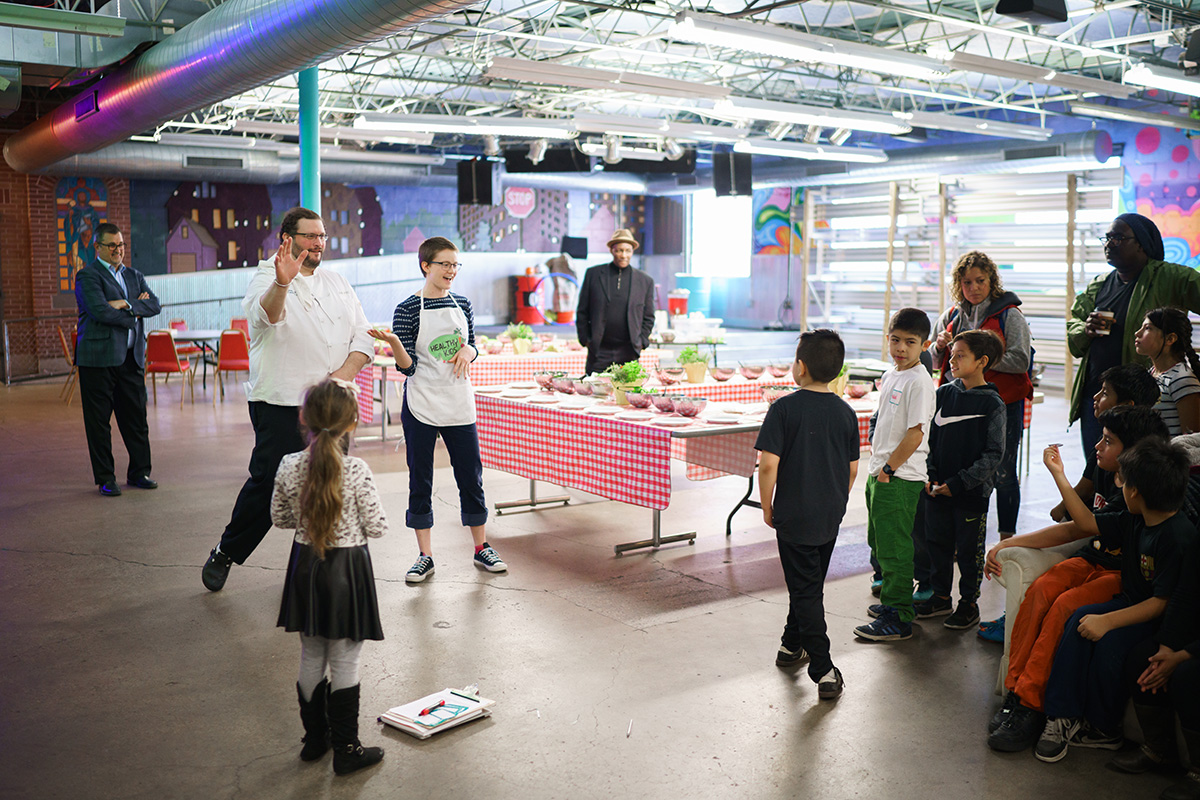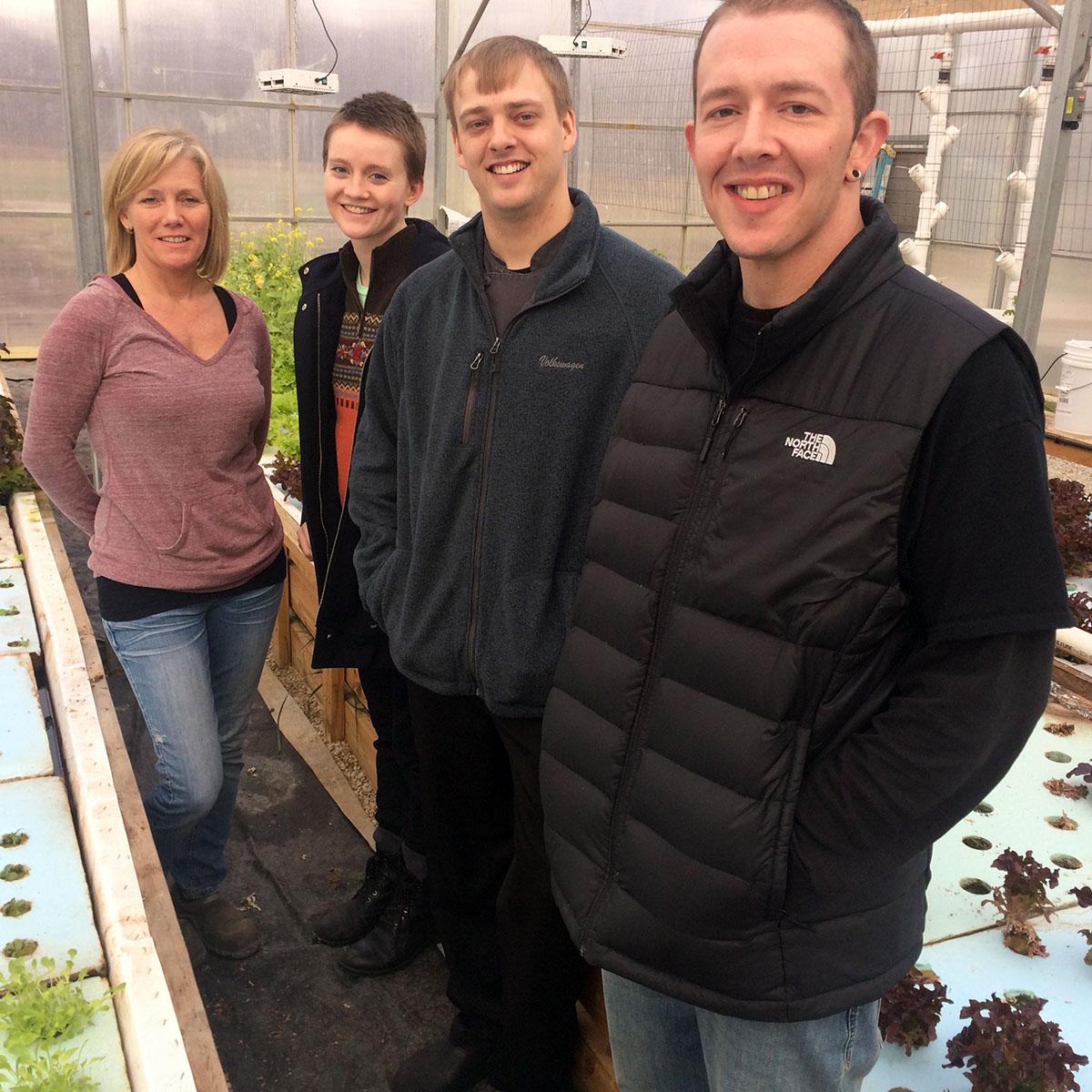From the Fellows: Farewell, Bon Appétit

Fellow Amanda Wareham (in apron) leads a Healthy Kids in the Bon Appétit Kitchen class with Best Buy Executive Chef Christian Pieper at the youth-focused nonprofit Urban Ventures in Minneapolis
Back when I was a student at Macalester College in Saint Paul, MN, I didn’t picture myself working for a corporation after graduation.
So when I first heard about Bon Appétit’s Fellows program, I was a bit hesitant to apply. But I was curious to learn more about whether a large food service company could effectively leverage its purchasing power for social and environmental justice. I had a vision of a just food system in my mind, but in my courses and conversations, I always felt at a loss for realistic solutions to these broad and systemic problems. Throughout college, I was quite attuned to signs of “greenwashing” and the conflict between true altruism and a market that could reward a false — or superficial — concern for justice. However, I did appreciate the transparent nature of Bon Appétit’s purchasing policies, and had positive experiences with the Bon Appétit team at Macalester.
“I’ve often wished that I could have a long chat with my former self and share my new perspective. I’ve recently realized that I have had the chance to do this to some degree…. Issues of food justice are not black and white, and a balance of committed critical thought and unified action is necessary to bring about meaningful change.”
No surprise, I did end applying to be a Fellow, and I have no regrets. Over the past two years, I’ve appreciated an increasingly nuanced view of the food system and the various players that create and perpetuate it. I’ve had the chance to bring students along on tours of dairy farms reminiscent of my own family’s. I’ve met aquaponic farmers dedicated to carrying delicate microgreens and herbs through to market, balancing their requirements with those of the tilapia and catfish in their system, and the valuable — though less visible — nitrifying bacteria making this symbiosis possible. I’ve had the opportunity to tour large farms working hard to compete in an industry that demands a high volume of product at lower prices. The Fellows and I have accompanied our Waste Programs Manager, Claire Cummings, to point out products that Bon Appétit chefs could purchase through our Imperfectly Delicious Produce program that farmers often had been composting as they had no other option to sell.
Respecting and supporting farmers has always been close to my heart, and I’ve felt that Bon Appétit chefs and managers hold themselves to a high standard in maintaining these important relationships, within the limits of a bustling kitchen. Beyond that, the leaders of Bon Appétit always strive to add more farmers to the Farm to Fork family. Students, faculty, and staff at each college and university I’ve visited have continually challenged me to critically examine the commitment with which Bon Appétit addresses the many injustices of the food system.

Farmer Missy Carrell, Fellow Amanda Wareham, Executive Chef Jordan Hall, and Catering Chef Josh Dunn at Ponderosa Aqua Farm
Connecting with people on many sides of complex questions has brought me to a deeper understanding of how systems may so easily sweep people into complacency, and distribute decision-making power unequally. It’s also helped me realize that with proper dedication and leadership in positions of power, there are a number of thresholds that can pivot in a more just direction. In a company made up of many folks who care deeply about a more just food system, with a large amount of buying power, these changes can impact a broad swath of people.
I’ve often — as I know many people do for varying reasons — wished that I could have a long chat with my former self and share my new perspective. I’ve recently realized that I have had the chance to do this to some degree. I’ve talked to students across the Midwest (and beyond) who are grappling with the same issues that I dealt with as a student. Issues of food justice are not black and white, and a balance of committed critical thought and unified action is necessary to bring about meaningful change.
I certainly don’t claim to have the answers, but I’ve learned a lot from Bon Appétit’s leaders, who have prioritized sustainability for the past 30 years. As with most large systems, the food system moves toward justice ever so slowly, but with more people like the incredible folks I’ve worked with over the past two years, I’m hopeful. Thank you to all those with whom I interacted during my Fellowship for sharing your wisdom, and also to those who are working in their own way toward a more just food system and world; I hope our paths cross again.